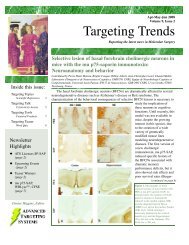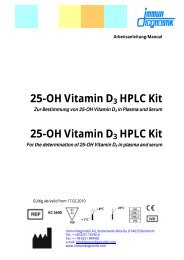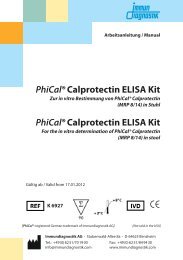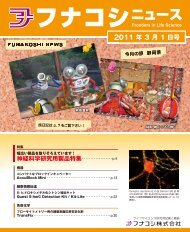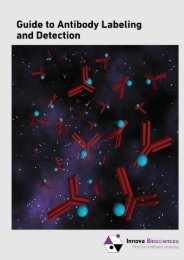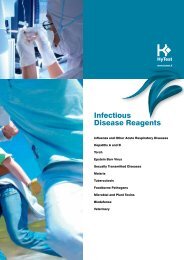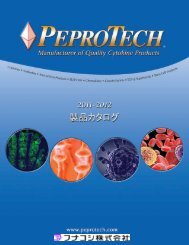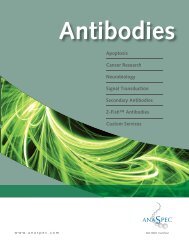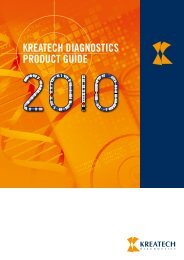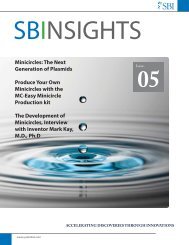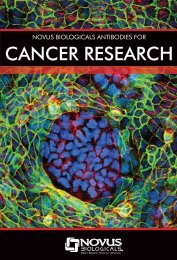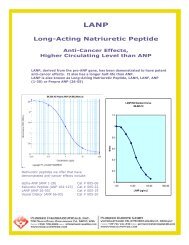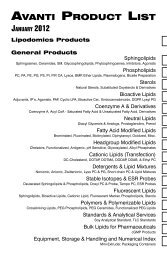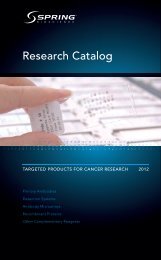T7 RNA Polymerase Expression System for Bacillus megaterium
T7 RNA Polymerase Expression System for Bacillus megaterium
T7 RNA Polymerase Expression System for Bacillus megaterium
You also want an ePaper? Increase the reach of your titles
YUMPU automatically turns print PDFs into web optimized ePapers that Google loves.
© MoBiTec GmbH, 2012 Page 3<br />
An efficient alternative to common <strong>Bacillus</strong><br />
<strong>megaterium</strong> expression systems:<br />
High yield protein expression with the <strong>T7</strong> <strong>RNA</strong><br />
polymerase expression system<br />
MoBiTec offers this dual plasmid expression system as an easy-to-handle solution with<br />
pretrans<strong>for</strong>med <strong>Bacillus</strong> <strong>megaterium</strong> protoplasts (MS941 carrying p<strong>T7</strong>-<strong>RNA</strong>P) ready <strong>for</strong><br />
trans<strong>for</strong>mation and Escherichia coli / <strong>Bacillus</strong> <strong>megaterium</strong> shuttle vectors.<br />
1. Introduction<br />
1.1. General features of <strong>Bacillus</strong> <strong>megaterium</strong><br />
First described over 100 years ago, B. <strong>megaterium</strong> has recently been gaining more and<br />
more importance in scientific as well as industrial applications. The source of its<br />
significant name "<strong>megaterium</strong>" is its large size of the vegetative cells (over 10 μm) and its<br />
spores. The capability of sporulation has made B. <strong>megaterium</strong> an important tool <strong>for</strong><br />
examining spore-mediated disease and cell development.<br />
B. <strong>megaterium</strong> is able to grow on a wide variety of carbon sources and thus has been<br />
found in many ecological niches such as waste from meat industry or petrochemical<br />
effluents. Also, the degradation of persistent insecticides by B. <strong>megaterium</strong> has been<br />
documented (Saxena et al., 1987; Selvanayagam and Vijaya, 1989) offering potential<br />
applications as detoxifying agent. One of the genetic regulatory elements <strong>for</strong> carbon<br />
utilization is the xylose operon. It has been described by Rygus and Hillen (1991) and is<br />
used in the expression system MoBiTec is offering in this kit.<br />
Further, several B. <strong>megaterium</strong> proteins are of importance. For example, a family of P450<br />
cytochrome monooxygenases is similar to eukaryotic P450 playing a role in many<br />
diseases. Industrial applications of enzymes excreted by B. <strong>megaterium</strong> are diverse,<br />
starting from amylases used in bread industry to penicillin amidase which is used <strong>for</strong> the<br />
generation of new synthetic antibiotics.<br />
An overview about the features of this unique organism is given in review articles as<br />
"Prime time <strong>for</strong> <strong>Bacillus</strong> <strong>megaterium</strong>" (Vary, 1994), “A short story about a big magic bug”<br />
(Bunk et al., 2010) and “<strong>Bacillus</strong> <strong>megaterium</strong> - from simple soil bacterium to industrial<br />
protein production host“ (Vary et al., 2007).<br />
1.2. <strong>Bacillus</strong> <strong>megaterium</strong> as expression host<br />
In molecular biology, B. <strong>megaterium</strong> has been proven to be an excellent host <strong>for</strong> the<br />
expression of non-homologous DNA. Cloning vectors of the B. <strong>megaterium</strong> system<br />
(derivatives of the original pWH1520 (Rygus and Hillen, 1991; Malten et al., 2006;<br />
Biedendieck et al., 2007)) rely on the above mentioned xylose inducible expression<br />
system used as regulatory element. Further, a <strong>T7</strong> <strong>RNA</strong> polymerase dependent promoter<br />
and terminator were introduced into a compatible vector.<br />
MoBiTec GmbH, Germany � Phone: +49 551 70722 0 � Fax: +49 551 70722 22 � E-Mail: info@mobitec.com � www.mobitec.com



